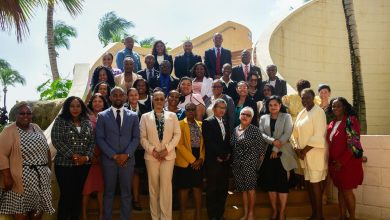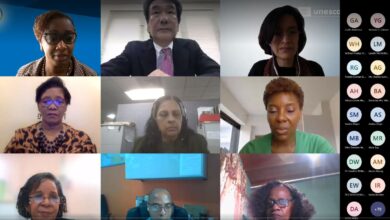Ministers of Government
Secretary-General
Deputy Secretary-General
Ambassadors
Representatives of Regional and International organizations
Ladies and Gentlemen
I welcome you on behalf of the Directorate of Human and Social Development to this Sixteenth Meeting of the Council for Human and Social Development (COHSOD).
This has been a very busy year for the Secretariat and the Community. For our Directorate, there have been some outstanding achievements which include two landmark events:
• The coordination of the activities leading up to the Summit on Non-Communicable Diseases held 15 September 2007 and resulting in the Declaration of Port-of-Spain establishing 18 actionable programmes; and
• The coordination of the Task Force on Functional Cooperation resulting from the Declaration of Needham Point, Barbados at the 28th Meeting of the Conference of Heads of Government which has mandated that through cooperation in a variety of areas, including the social sectors, the goal is to achieve “A Community for All”.
These mandates provide immediate and long-term challenges.
First, in coordinating the implementation of concrete activities to reduce the negative impact of non-communicable diseases that account for more than half the number of deaths in the Community, Member States have committed to establishing National Committees on NCDs and, through them, to introduce some major policies which include the introduction of compulsory physical education in schools, healthy school meals, banning of smoking in public places, the introduction of health taxes and the creation of an enabling environment to encourage the public to engage in physical exercise.
This landmark Declaration may be traced directly to the historic resolution at the Ninth Meeting of the COHSOD in April 2003 here in Georgetown which recommended the establishment of the Caribbean Commission on Health and Development. That Commission, chaired by Sir George Alleyne, produced the seminal Report, the blue print for the wellness agenda designed to respond to the Nassau Declaration 2001 which recognized that the Health of the Region is the Wealth of the Region.
Second, by establishing the mechanisms for functional cooperation, it is intended that regional institutions and programmes will be implemented through sharing of resources that would allow both Member states and Associate States that are not directly involved in all aspects of the CSME to participate as equal partners in the life of the Community.
This inclusive approach, while recognizing that the vitality of the Region rests on the consolidation of the CARICOM Single Market and Single Economy, provides for cooperation on essential activities to advance the welfare and well-being of the peoples of the Community. The framework for realizing the potential of youth and culture which intersects with the theme of this COHSOD, will inform the elements that are incorporated into functional cooperation. And while the work of the Task Force on Functional Cooperation is expected to be completed by March 2008, it is clear that many of its points of reference will connect up with the work of this Council.
This Council has also piloted some important policies and programmes over the past year, some of which will form part of the discussions during the next two and a half days. Among the most notable are:
• The establishment of the Caribbean Vocational Qualifications;
• The completion of the legal regulations for the free movement of skilled nationals, including the certification of artisans;
• The establishment of the Caribbean Commission for Youth and Development co chaired by Prof Barry Chavannes and Ms Yldiz Beigle;
• The completion of the process for the establishment of the third phase of the Caribbean Cooperation in Health and integrating the regional health institutions into a Caribbean Public Health Authority;
• Initiating the process for negotiating better arrangements for procurement of pharmaceuticals and other health services under TRIPS;
• Accelerating the approach to reducing HIV/AIDS, coordinated by the Pan Caribbean Partnership against HIV/AIDS (PANCAP) and focusing on the attainment of Universal Access to Prevention, Care and Treatment by 2010
• Coordinating the activities related to the observance of the 200th Anniversary of the abolition of Slavery.
But these achievements by themselves do not fully illustrate how the programmes of the Directorate of Human and Social Development have connected up with the people of this Community, especially at the grass roots. For example, our health and education officers through coordinated positive life skills activities have reached out to 26 inner city groups of youth in Trench Town, Spanish Town and Montego Bay, in Jamaica. They conducted similar activities in 8 other countries from Belize, through St Kitts/ Nevis to Guyana and Suriname.
Then there is the mini-grants programme sponsored by PANCAP but planned and coordinated by the CARICOM Youth Ambassadors which has touched the lives of young people in communities all over the region and has demonstrated beyond a doubt that Caribbean youths have the potential to provide meaningful leadership and service to this Community, if they are provided with the enabling environment and if the necessary provision is made for their empowerment.
It is this Council that took the bold step to formally adopt a resolution at its Twelfth meeting here in Georgetown (2005) to promote edutainment as part of the tools of its cultural expressiveness to reach out to the youth from all walks of life. It specifically recommended that we support the initiatives of Caribbean Vizions led by the then 12 year old CEO named Choc’late. Guyana, Jamaica, Trinidad and Tobago, St. Kitts and Nevis and St. Vincent and the Grenadines all testify to the positive impact of these activities.
These successes however would not have been possible without the political will and without the leadership of the immediate past chairs of the COHSOD, namely, the Hon Anthony Wood, Minister of Education, Youth and Sport and Dr. the Hon Jerome Walcott, Minister of Health, both of Barbados. To them we wish to record our deepest appreciation.
On behalf of the Directorate, I also wish to thank our colleagues in the other Directorates and Units within the Secretariat, especially the Resource Mobilization and Technical Cooperation Unit, the Office of Finance, the Office of the General Counsel, the Public Information Unit and the Conference Services Unit and of course, the Offices of the Secretary-General and the Deputy Secretary-General for their unstinting support and collaboration.
To our core development partners for their sponsorship of our programmes, we must record our appreciation. We are glad that some of you are here with us at this meeting to share your ideas and assist us as we chart programmes for the future.
Above all we celebrate the new directions that are being designed in culture and in youth development. We feel confident that the deliberations and decisions taken at this COHSOD would lead us along the way toward realizing the potential of youth and culture in the development of this Region.





